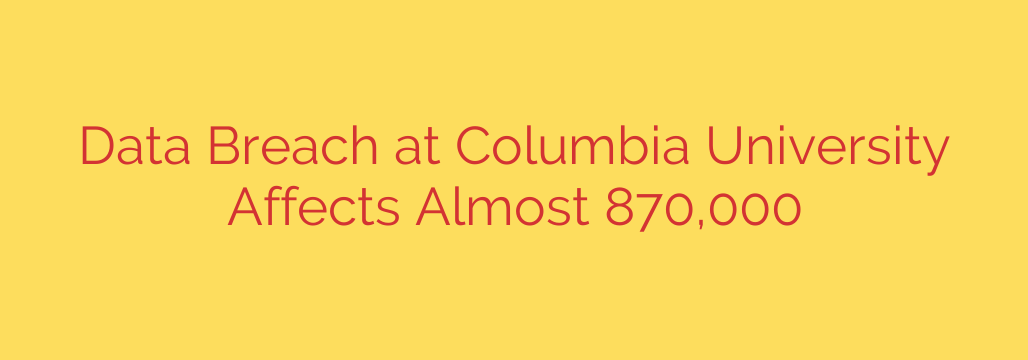
Major Data Breach at Columbia University Exposes Data of Nearly 870,000
A significant data security incident at Columbia University has compromised the personal information of nearly 870,000 individuals. The breach stemmed from a vulnerability in a widely used file transfer software, highlighting the persistent cybersecurity challenges facing higher education institutions and their vast networks of data.
If you have a connection to the university, it is crucial to understand the scope of this breach and take immediate steps to protect your personal information.
What Happened? Details of the Security Incident
The breach was not a direct attack on Columbia University’s core systems but rather exploited a vulnerability within a third-party file transfer application called MOVEit. This software is used by thousands of organizations worldwide, including corporations, government agencies, and universities, to securely share large data files.
Cybercriminals discovered a critical flaw in the software that allowed them to gain unauthorized access to servers running the application. In this case, they successfully accessed and downloaded files containing sensitive data belonging to individuals associated with the university. While the university’s internal network was not compromised, the data stored on this third-party platform was exposed.
Who Was Affected and What Data Was Exposed?
The breach affected a large and diverse group of individuals connected to a specific benefits program administered by the university. The exposed files contained a significant amount of personally identifiable information (PII), which could be used for identity theft and other fraudulent activities.
According to official notifications, the compromised data may have included the following:
- Full Names
- Social Security Numbers
- Dates of Birth
- Addresses
- Information related to benefits and retirement plans
The university has begun the process of notifying all affected individuals directly by mail. If you believe you may be impacted but have not yet received a letter, it is wise to act proactively.
Actionable Security Tips: How to Protect Yourself Now
When sensitive data like Social Security numbers are exposed, the risk of identity theft increases dramatically. It is essential to take immediate, preventative measures.
1. Consider a Credit Freeze
A credit freeze is one of the most effective tools for preventing identity theft. It restricts access to your credit report, making it difficult for malicious actors to open new accounts in your name. You must contact each of the three major credit bureaus individually to place a freeze:
- Equifax
- Experian
- TransUnion
Placing and lifting a credit freeze is free of charge and provides a powerful layer of protection.
2. Monitor Your Financial Accounts and Credit Reports
Keep a close eye on your bank accounts, credit card statements, and other financial records for any suspicious activity. You are entitled to a free credit report from each of the three bureaus once a year through AnnualCreditReport.com. Review these reports carefully for any accounts or inquiries you don’t recognize.
3. Be on High Alert for Phishing Scams
Cybercriminals often use stolen data to create highly convincing phishing emails, text messages, and phone calls. Be extremely cautious of unsolicited communications that claim to be from Columbia University, your bank, or any other institution. These messages may use your personal information to appear legitimate. Never click on suspicious links or provide personal information in response to an unsolicited request.
4. Take Advantage of Offered Identity Theft Protection
Columbia University is offering complimentary identity theft and credit monitoring services to all individuals impacted by this breach. Be sure to enroll in this service as soon as you receive your notification letter. These services can alert you to potential fraud, help you resolve issues, and provide insurance coverage for theft-related expenses.
This incident serves as a stark reminder that even the most secure organizations can be impacted by vulnerabilities in their supply chain. As digital ecosystems become more interconnected, maintaining personal data security requires constant vigilance from both individuals and institutions.
Source: https://www.bleepingcomputer.com/news/security/columbia-university-data-breach-impacts-nearly-870-000-students-applicants-employees/








